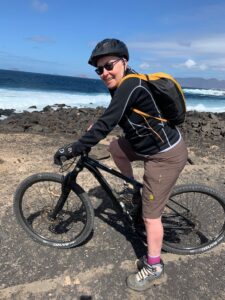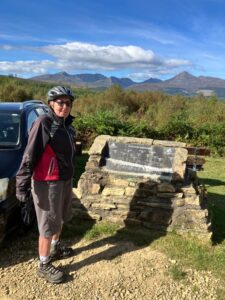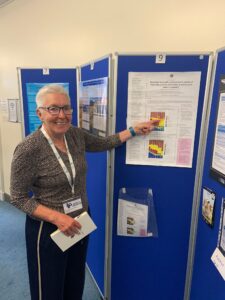BJSM Blog editors recently had the pleasure of interviewing Professor Nanette Mutrie MBE about her outstanding career in physical activity for health. We hope you enjoy reading what she had to say!
Name: Nanette Mutrie
Current role/position: Professor Emerita University of Edinburgh and Coaching and Education Officer Pickleball Scotland
Could you give us a career path/journey overview?
 I’ve had a 50 year career! Half a century helping people become more active. First as a PE teacher in Scotland, then a spell in sport management at University of Glasgow. During that time I decided to pursue further academic qualifications and after doing an M.Ed degree at Glasgow I was fortunate enough to gain a Fulbright Scholarship to pursue a PhD with Professor Dorothy Harris at the Pennsylvania State University. That degree allowed me to major in Sport and Exercise Psychology and I eventually became a Chartered Psychologist with the British Psychological Society and the British Association of Sport and Exercise Sciences accredited Psychologist.
I’ve had a 50 year career! Half a century helping people become more active. First as a PE teacher in Scotland, then a spell in sport management at University of Glasgow. During that time I decided to pursue further academic qualifications and after doing an M.Ed degree at Glasgow I was fortunate enough to gain a Fulbright Scholarship to pursue a PhD with Professor Dorothy Harris at the Pennsylvania State University. That degree allowed me to major in Sport and Exercise Psychology and I eventually became a Chartered Psychologist with the British Psychological Society and the British Association of Sport and Exercise Sciences accredited Psychologist.
On my return to Glasgow University after the PhD [my position was held open which I think would not happen anywhere today], I helped develop one of the first Sports Science degrees in the UK and my academic career began. After a sabbatical at the Medical Research Council’s Social and Public Health Sciences unit, where I really began to understand physical activity as a public health topic, I was promoted to Professor of Physical Activity and Public Health Science in the year 2000. From that point forward I was involved in Scottish policy in relation to physical activity. Let’s make Scotland more active was a strategy that was released in 2003 and laid the foundations for Scotland’s approach to increasing population levels of activity.
I am still involved in Scottish policy and chair the Active Scotland division of the government development group. I moved to the University of Strathclyde in 2004 and enjoyed many years there developing new degree programmes in Sport and Physical Activity and establishing the physical activity for health research agenda in Scotland. My final career move was to the University of Edinburgh in 2012 where I was appointed to lead the Physical Activity for Health Research Centre to which I am still proudly attached as Professor Emerita now that I have retired.
 What are your personal interests/passions?
What are your personal interests/passions?
Currently I am loving being involved with the new [at least to Scotland] sport of Pickleball. As Coaching and Education Officer for Pickleball Scotland I have been developing coaching qualifications and delivering coaching workshops – a great challenge that brings together my academic knowledge and my practical teaching/coaching experience. I also love walking my dogs and playing golf – both very appropriate activities since I have frequently said ‘walking is the best buy in public health’.
What was the best decision you ever made in your career?
That is a tough question! I have a lot to reflect back on to wonder about… but I think it was the early decision to move to a sport management position at the University of Glasgow rather than remain a PE teacher in a school. At the University my focus was how to help students and staff gain enjoyment from activity – that required a new approach in a unit that had previously been primarily about sport performance. But also at the University I had the chance to gain academic qualifications.
What was the biggest risk you ever took? How do you feel about it now?
That is slightly easier – it was a risk to go to the USA to study for a PhD. At the time there was no UK University where the topic of Sport or Sports Science or Physical Activity for Health could be studied at doctoral level. The risks were many – did I have the ability? Would I like the USA? What would my career be on return to the UK? Now I feel that experience was the making of me as a person and as an academic who was fortunate enough to contribute to the development of sport and exercise science in the UK as a result.
What 3 things are you most thankful for in your career?
- Great educational opportunities: first in physical education at Dunfermline College of PE where we had a genuine liberal education with arts and sciences all covered; second at Penn State where I became a well rounded academic with learning in all the relevant sciences and research methods.
- Great mentorship from three people in particular: Professor Dorothy Harris [Penn State University], Professor Peter Radford [Glasgow University] and Dame Professor Sally Macintyre [MRC].
- Great colleagues that make work a joy. I have to mention my great pals ‘the Pitlochry Six’ who all worked together at the University of Glasgow – we still meet regularly and always have fun together. There are many others – perhaps too many to mention in a short answer – and most recently my PAHRC colleagues but I am really thankful to [mostly] have had the chance to have fun at work.
What are you most proud of in your career?
I am most proud of the role I have played in producing 4 editions of a textbook – Psychology of Physical Activity – Determinants, Wellbeing and Interventions. This would not have been possible without the leadership of Professor Stuart Biddle [now living in Australia] whom I met at a conference in the 1980s. At the conference we discussed the need for a psychology book which focussed on health rather than performance. He led the writing of the first book in 1991 and the subsequent editions with the latest in 2021.
 What is the most challenging project you have ever undertaken?
What is the most challenging project you have ever undertaken?
I once led a project which focussed on the potential benefits of physical activity for women with breast cancer. It was challenging to get funding [but we did via Cancer Research UK]; challenging to get relevant medical professionals on board [but we did with an oncologist who championed the cause]; challenging to recruit women [but we did recruit over 200 after we realised we needed to work with the gatekeepers who were specialist nurses and clinicians who did not initially see the benefits in activity]; challenging to keep the multidisciplinary team happy [but we did and had a successful outcome and publication record which we were all proud of.
What advice would you give to a younger version of yourself – say between the age of 25-30 years-old?
Hang on to your belief that physical activity is a topic worth studying and researching – all will be well!
What tips would you give to early career researchers/academics to improve their career prospects?
Hang out with great people! By that I mean people you respect for their knowledge and values. Try to join project teams that are led by such people. Volunteer to take on what might seem to be extra work [providing not overwhelming] when the opportunity is offered. Give back to your profession via a relevant professional body – this gives a code of conduct and a community to connect with and often offers leadership opportunities.